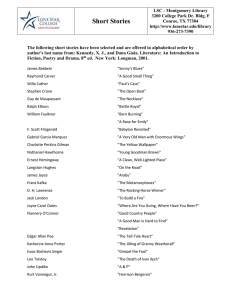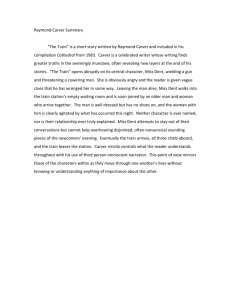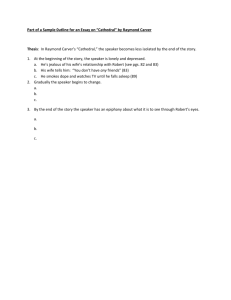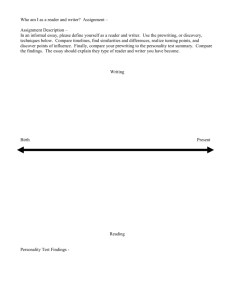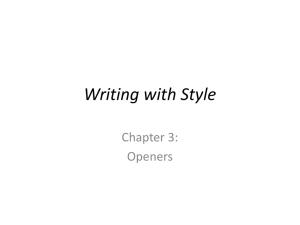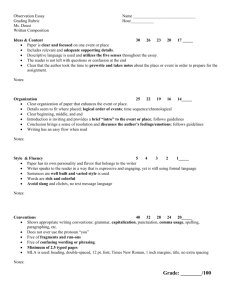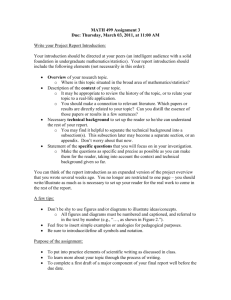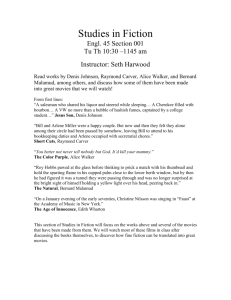MWF: 11:00am-11:50am OFFICE: BUS 248 Office Hours: Gladly By
advertisement
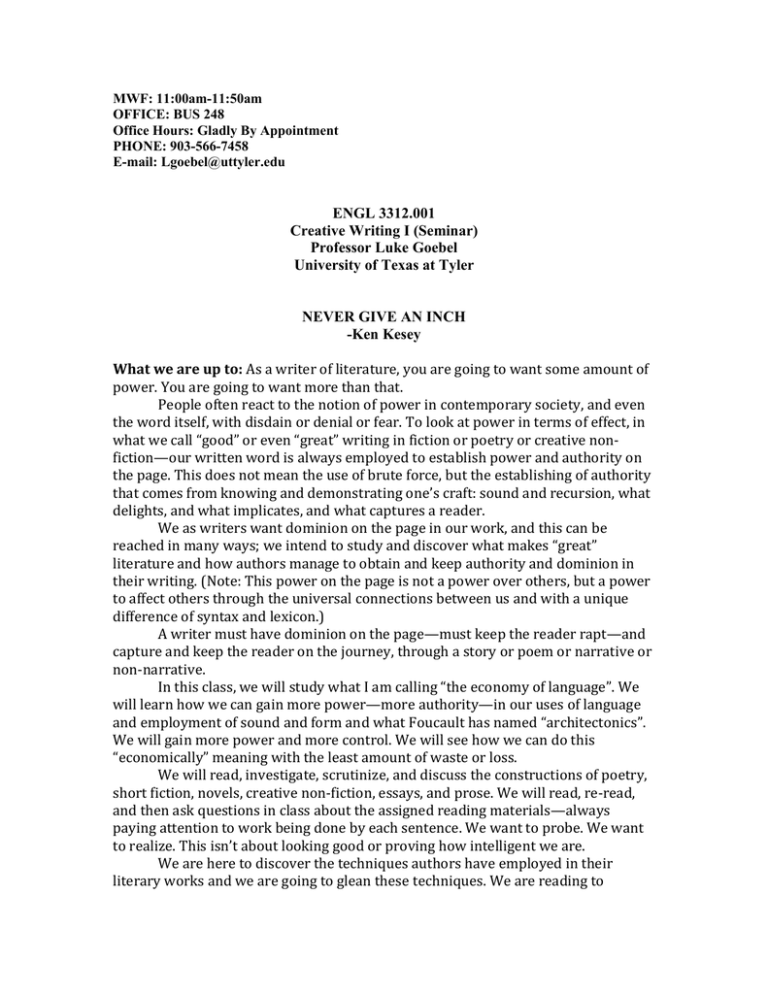
MWF: 11:00am-11:50am OFFICE: BUS 248 Office Hours: Gladly By Appointment PHONE: 903-566-7458 E-mail: Lgoebel@uttyler.edu ENGL 3312.001 Creative Writing I (Seminar) Professor Luke Goebel University of Texas at Tyler NEVER GIVE AN INCH -Ken Kesey What we are up to: As a writer of literature, you are going to want some amount of power. You are going to want more than that. People often react to the notion of power in contemporary society, and even the word itself, with disdain or denial or fear. To look at power in terms of effect, in what we call “good” or even “great” writing in fiction or poetry or creative nonfiction—our written word is always employed to establish power and authority on the page. This does not mean the use of brute force, but the establishing of authority that comes from knowing and demonstrating one’s craft: sound and recursion, what delights, and what implicates, and what captures a reader. We as writers want dominion on the page in our work, and this can be reached in many ways; we intend to study and discover what makes “great” literature and how authors manage to obtain and keep authority and dominion in their writing. (Note: This power on the page is not a power over others, but a power to affect others through the universal connections between us and with a unique difference of syntax and lexicon.) A writer must have dominion on the page—must keep the reader rapt—and capture and keep the reader on the journey, through a story or poem or narrative or non-narrative. In this class, we will study what I am calling “the economy of language”. We will learn how we can gain more power—more authority—in our uses of language and employment of sound and form and what Foucault has named “architectonics”. We will gain more power and more control. We will see how we can do this “economically” meaning with the least amount of waste or loss. We will read, investigate, scrutinize, and discuss the constructions of poetry, short fiction, novels, creative non-fiction, essays, and prose. We will read, re-read, and then ask questions in class about the assigned reading materials—always paying attention to work being done by each sentence. We want to probe. We want to realize. This isn’t about looking good or proving how intelligent we are. We are here to discover the techniques authors have employed in their literary works and we are going to glean these techniques. We are reading to discover how the writer has achieved what they have: this isn’t about morality, right and wrong, and moralizing. We will be doing some analysis of texts, but not for the sake of traditional criticism—we will be analyzing affect, economy, and dominion in pursuit of taking a clearer look at our writing in order to gain power in our work. We want to listen to ourselves and to others both on the page and in speech. We must read closely and pay great attention to sound and affect and power. By the time we have begun in full, you should be thinking of sound and affect in all things— you should be thinking of economy and affect entirely. Even your text-messages will become acts of composition you will scrutinize into maddening bits of language, sound and music, and you will likely find yourself revising them over and over again before sending. What we are going to learn is how to prevent “lossiness”, as in the loss of power, of control, of economy, of implication of the reader, and of delight—thus the loss of our ability to keep the reader and ourselves all the way into what is being done on the page—to keep the reader and self feeling the power of craft. This is a creative writing course. We will write imitations and we will mostly craft our own stories, prose, and poems. Through studying the works of authors, paying close attention to their “economy of language” and “affect” our goal will be to grow stronger. We also will discover why it is that we write. Before we can prevent “lossiness”, we must have something original compelling us to the page. This class should inspire you to find what you must write, and should teach you how to craft your writing with attention to the elements of writing we are to study. Of course, we will work and workshop our writing from what we learn and agree upon from our investigations. The Work and the Process: We will read and we will discuss a wide array of texts to investigate how authors have exhibited economy of language, control, and mastered affect. You will write personal imitations and engage in meaningful discussions with our fellow writers. Perhaps most importantly, every member of this class will participate in workshop, giving and receiving careful feedback within the workshop setting we will create together. Each of you will create a portfolio of your writing—both self-directed writing and writing generated through assignments given in class. What you write will be strengthened through revision and revision will be strengthened and directed through class and workshop. We will forge meaningful and rigorously honest relationships, with the hope that we will build lasting connections—one of the greatest tools and sources of inspiration for a writer is another writer with a good ear and an honest tongue. Hopefully, you will leave this class with at least one good reader whom you can show your work when you are no longer in a creative writing class/workshop. Note: Although playing it safe, being complimentary or silent about another’s work during workshop may seem kind or may appear to pay off in terms of popularity or comfort, in workshop this is harmful and unkind. While tact is a necessary component, and feedback must be given in a manner that is supportive to the work and the author, a workshop is a place (as the name entails) for craftsmanship. This always entails shaving, sanding, reworking, pitching—we need others that help us to see that which we are not aware of in our writing. That being said, you also need to have the strength to know when you are on the trail, following your guts, even if others don’t see it or praise it. Format: The course will be divided into the study of five literary elements. • Character: What makes a successful character? How is this different from what makes a successful person? How does one determine which P.O.V. to employ? Why are the greatest characters flawed? What do we want from a character that we do not necessarily want from a friend, a love, a family member? Why do we want flawed characters, evil characters, characters that disgust us? What about unreliable narrators? • Place: How does a writer establish place within a text economically? What it he relationship between place, characters, and plot? How do authors create sensory location? Why do authors place their characters where they do? • Plot: What makes a story a story? What makes a poem a poem? How are narrative arcs created? What shape do these arcs take and why? The basic story is: a character begins somewhere and ends somewhere. What are the economics of action between these events? How do you know when a story should end? Where it should begin? What should and should not be included? Why do some fictions appear to be non-fiction? What is the relationship between fiction and non-fiction in writing? How are these genres blurred? • Style: What do we mean by style? How do we talk about it? How do we discover our own style in our work? In what ways is an author’s voice determined by the collective structures of language, and in what ways can an author testify or signify in a way that is uniquely their own? • Form: How is space utilized on a page? What forms are employed for what affects? What does the visual presentation of a text tell us? What are recursion, divergence, and repetition used to achieve? Of course all of these overlap and we will look at more than one element at a time; we will use these elements as a springboard to discuss specific texts, but our discussion will never be limited to any one of these terms at any one time. Required Texts: 1) Sam Michel, Lincoln Dahl Turns Five (this text will be provided) 2) Barry Hannah, AIRSHIPS 3) Raymond Carver, What We Talk About When We Talk About Love 4) Ben Marcus, The Anchor Book of New American Short Stories 5) One piece of poetry or prose (or several short pieces) that you will bring to read aloud during our first week of class—something(s) you find exemplary in terms of sound and affect. 6) Your work. You will bring copies of this work for everyone in class. Bring your photocopied work on the class meeting prior to the one in which your work will be discussed and work-shopped. Each person will respond in the form a letter to the work you have submitted, and these letters will be handed to you at the end of the discussion of your work. GRADES: Half of your grade will depend on y our participation. This includes: attendance, discussion, commitment to the work of your peers in workshop, and the letters you will write to your peers for their workshop dates. Also, a presentation on a reading, in which you will introduce the author and begin and lead the discussion initially around the literature we are discussing in class. The Other Half of Your Grade: is based on the portfolio of work you will turn in at the end of the semester. This will be 13-20 pages of writing that you generated and work-shopped in class. This will be revised “final” work that has been written during the semester and which has gone through the workshop process. Quizzes: There will be quizzes on the material assigned. These quizzes are random, cannot be made up, and count for toward the 50% portion of your grade based on participation. Often they will cover a few terms and central concepts, and should you prove you have read diligently, I will allow you to miss a few terms as long as you show you have read diligently, and you will still receive a top grade. Attendance & Tardiness: You will be on time, present, and appropriately engaged in class meetings. You may miss 3 classes before your grade is penalized, and this includes excused absences. After this, your grade will suffer for unexcused absences that follow. Each class you miss after the allotted three absences will lower your final course grade by one half of a letter grade. Students Rights and Responsibilities To know and understand the policies that affect your rights and responsibilities as a student at UT Tyler, please follow this link: http://www.uttyler.edu/wellness/StudentRightsandResponsibilities.html Grade Replacement/Forgiveness If you are repeating this course for a grade replacement, you must file an intent to receive grade forgiveness with the registrar by the 12th day of class. Failure to do so will result in both the original and repeated grade being used to calculate your overall grade point average. Undergraduates will receive grade forgiveness (grade replacement) for only three course repeats; graduates, for two course repeats during his/her career at UT Tyler. State-Mandated Course Drop Policy Texas law prohibits a student who began college for the first time in Fall 2007 or thereafter from dropping more than six courses during their entire undergraduate career. This includes courses dropped at another 2-year or 4-year Texas public college or university. For purposes of this rule, a dropped course is any course that is dropped after the 12th day of class (See Schedule of Classes for the specific date). Exceptions to the 6-drop rule may be found in the catalog. Petitions for exemptions must be submitted to the Registrar's Office and must be accompanied by documentation of the extenuating circumstance. Please contact the Registrar's Office if you have any questions. Disability Services In accordance with federal law, a student requesting accommodation must provide documentation of his/her disability to the Disability Support Services counselor. If you have a disability, including a learning disability, for which you request an accommodation, please contact Ida MacDonald in the Disability Support Services office in UC 282, or call (903) 566-7079. Social Security and FERPA Statement: It is the policy of The University of Texas at Tyler to protect the confidential nature of social security numbers. The University has changed its computer programming so that all students have an identification number. The electronic transmission of grades (e.g., via e-mail) risks violation of the Family Educational Rights and Privacy Act; grades will not be transmitted electronically. Emergency Exits and Evacuation: Everyone is required to exit the building when a fire alarm goes off. Follow your instructor’s directions regarding the appropriate exit. If you require assistance during an evacuation, inform your instructor in the first week of class. Do not re-enter the building unless given permission by University Police, Fire department, or Fire Prevention Services. Detailed Syllabus: We will get behind schedule due to delight and this schedule WILL CHANGE! F: 1/13/12 M: 1/16 W: 1/18 F: 1/20 Introductions: getting to know one another. Discussion of our favorite writers/texts. Looking at a brief piece of writing. Syllabus Review. Discussion of Aristotle’s, “Poetics”. Students bring in a paragraph or excerpt of an author’s writing which is exemplary. Look at opening of Moby Dick. Discussion of Giambattista Vico’s, “The New Science”. A look at abstractions and metonymy. Reading of “The Forgotten Dialect of the Heart” by Jack Gilbert. Discussion and Lecture on excerpts by Burke, Shelley, Delouse, and Foucault. Look at opening of A Catcher in the Rye by J.D. Salinger. Character: M: 1/23 W: 1/25 F: 1/27 Discussion of 1st person P.O.V. in George Saunder’s “Sea Oak”. Bring in your first paragraph which you have written for this course. Discussion of characters who disgust in Nick Montemarano’s “The Usual Human Dissabilities” and Flannery O’Connor’s “A Good Man Is Hard to Find”. Reading from WASTE by Eugene Marten More First Person Narratives: Stanley Elkin’s “A Poetics for Bullies” and Barry Hannah’s “Testimony of Pilot” (First Writing Prompt Assigned for HW) M:1/30 W: 2/1 F: 2/3 Discussion of Author as “speaker” in several of Raymond Carver’s stories from What We Talk About When We Talk About Love. Discussion of returning characters: a selection of readings from Sam Michel’s stories from Under The Light Catch Up Day: Final Day of Character Style: Differentiating the Universal: M: 2/6 W: 2/8 F: 2/10 M: 2/13 W: 2/15 F: 2/17 M: 2/20 W: 2/22 Discussion of Catherine Foulkrod’s “Ceramica” and George Saunder’s essay “The Perfect Gerbil” Discussion of Barry Hannah’s “Dragged From His Tomb Fighting” and stories by Gary Lutz Discussion of Lori Moore’s “People Like That are the Only People Here” Reading of Gordon Lish’s “Facts of Steel” Open Workshop: Reading Your Work Aloud WORKSHOP Three Students __________&___________&________________ Discussion of poems by Joe Wenderoth and 2 stories by Pamela Ryder Sound and Delight: Difference and Repetition: Discussion of Opening of Lolita by Vladimir Nabokov and excerpts from Samuel Beckett’s Malloy Discussion of Kate Braverman’s “The Collective Voice of Los Angeles Speaks: Marilyn Monroe or They Take a Photo of You When You Get Here” and selected poems by Jack Gilbert Place: F: 2/24 M: 2/27 W: 2/29 F: 3/2 Discussion of Tom Wolfe’s “Las Vegas (What?) Las Vegas (Can’t hear you! Too Noisy) Las Vegas!!!!” and Raymond Carver’s “Gazebo” and “Sacks” Discussion of “The View From Mrs. Thompson’s” by David Foster Wallace and excerpts from Malloy by Samuel Beckett Discussion of Noy Holland’s “Absolution” and Raymond Carver’s “The Third Thing That Killed My Father Off” Discussion of J.D. Salinger’s “A Perfect Day for Banana Fish” and Arthur Miller’s “Bulldog” Plot: M: 3/5 W: 3/7 F: 3/9 WORKSHOP Three Students __________&___________&________________ WORKSHOP Three Students __________&___________&________________ WORKSHOP Three Students __________&___________&________________ M: SPRING BREAK (READ Lincoln Dahl Turns Five over Spring Break) W: SPRING BREAK (READ Lincoln Dahl Turns Five over Spring Break) F: SPRING BREAK (READ Lincoln Dahl Turns Five over Spring Break) M: 3/19 W: 3/21 F: 3/23 Discussion of plot in Susan Steinberg’s “Isla”, “The School” by Donald Barthelme and “Why Don’t You Dance” by Raymond Carver WORKSHOP Three Students __________&___________&________________ Discussion of Harold Brodkey’s “His Son In His Arms In Light Aloft” Form: F: 3/30 Discussion of form in Barry Hannah’s “Return to Return” and J.D. Salinger’s “Pretty Mouth and Green Eyes Poems by Joe Wenderoth and Eileen Myles and “Popular Mechanics” by Raymond Carver WORKSHOP Three Students __________&___________&________________ M: 4/2 W: 4/4 F: 4/6 WORKSHOP Three Students __________&___________&________________ WORKSHOP Three Students __________&___________&________________ WORKSHOP Three Students __________&___________&________________ M: 4/9 Discussion of Ernest Hemmingway’s “Hills Like White Elephants” and Fitzgerald’s The Great Gatsby (you don’t have to read this novel for this class) Discussion of James Purdy’s “Why Won’t They Tell You Why” Discussion of Raymond Carver’s “A Serious Talk” and “One More Thing” M: 3/26 W: 3/28 W: 4/11 F: 4/13 M: 4/16 WORKSHOP Three Students __________&___________&________________ W: 4/18 WORKSHOP Three Students __________&___________&________________ F: 4/20 WORKSHOP Three Students __________&___________&________________ M: 4/23 Discussion of Outliers of Genre: Poems by Rosmarie Waldrop and short-short shorts as a genre W: 4/25 WORKSHOP Three Students __________&___________&________________ F: 4/27 WORKSHOP Three Students __________&___________&________________ M: 4/30 WORKSHOP Three Students __________&___________&________________ W: 5/2 Final Class TBA
